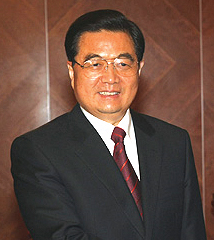By Christopher Bodeen
The Associated Press

President Hu Jintao
BEIJING, China (AP)—China’s President Hu Jintao is scheduled to visit the United States in January, a senior U.S. official said Thursday, Oct. 21st in the latest sign that a thaw in relations is gathering momentum.
U.S. Attorney General Eric Holder also said that during meetings this week with Chinese officials in Beijing, he raised the case of imprisoned Nobel Peace Prize laureate Liu Xiaobo, which remains a point of contention between the two sides, with the U.S. government calling for Liu’s release.
China’s government was incensed by the awarding of the prize to Liu earlier this month, calling it a gross interference in its internal affairs. Liu, a literary critic and dissident writer, was sentenced to 11 years in prison last year after co-authoring a call for political reform labeled seditious by the ruling Communist Party.
While a January visit by Hu has long been under discussion, Holder was the first official from either side to formally confirm it. He declined to give a specific date or other details.
Relations between the countries plunged earlier this year over disagreements about everything from trade policy to U.S. arms sales to Taiwan. Since the summer, however, both sides have worked to smooth over the problems and U.S. Defense Secretary Robert Gates plans to visit Beijing next year after being denied an invitation during a visit to the region earlier this year.
“Given the nature of the Chinese-American relationship and the importance of that relationship, there are going to be areas upon which we will simply not agree,” Holder said.
“But that does not mean that the relationship should not go forward, and this should be seen as a priority for both our nations,” he said.
Over two days of meetings with Chinese counterparts, Holder said he discussed ways to cooperate on fighting intellectual property rights violations, transnational crime, and other common concerns.
The sides pledged closer coordination on fighting cybercrime and hacking, and to share information and intelligence on terrorist activity in a timely fashion.
“We agreed that we will work together to achieve tangible results in anticipation of the visit of President Hu to Washington in January 2011,” Holder told reporters.
Hu, who told visiting American officials in September that he wanted to see healthy and stable ties between the countries, is also expected to meet President Barack Obama at the G-20 summit in South Korea in November.
Asked about the visit, Chinese Foreign Ministry spokesman Ma Zhaoxu offered no specifics.
“I believe that will be a very important visit that can have profound, far-reaching influence on the future of China-U.S. relations,” Ma said at a regularly scheduled news conference on Thursday.
Despite the positive tone, Holder’s comments about Liu underscored continuing tensions between Washington’s hopes for a liberalizing trend in Beijing and the Communist Party’s determination to crush any challenge to its authority.
“This is an area in which the United States and China have a fundamental disagreement,” Holder said, citing comments by Obama praising Liu and calling for his release.
“We believe that China should respect the fundamental human rights of all its citizens and that includes Liu,” Holder said.
He also cited disagreements over China’s approach to its restive western Xinjiang region, where resentment over heavy-handed Chinese rule among the native Muslim Uighur population has sparked sporadic violence.
China has sought to link Uighur calls for self-rule to global Islamic terrorism, while Washington says Beijing should offer greater respect for their religious and cultural rights. ♦



